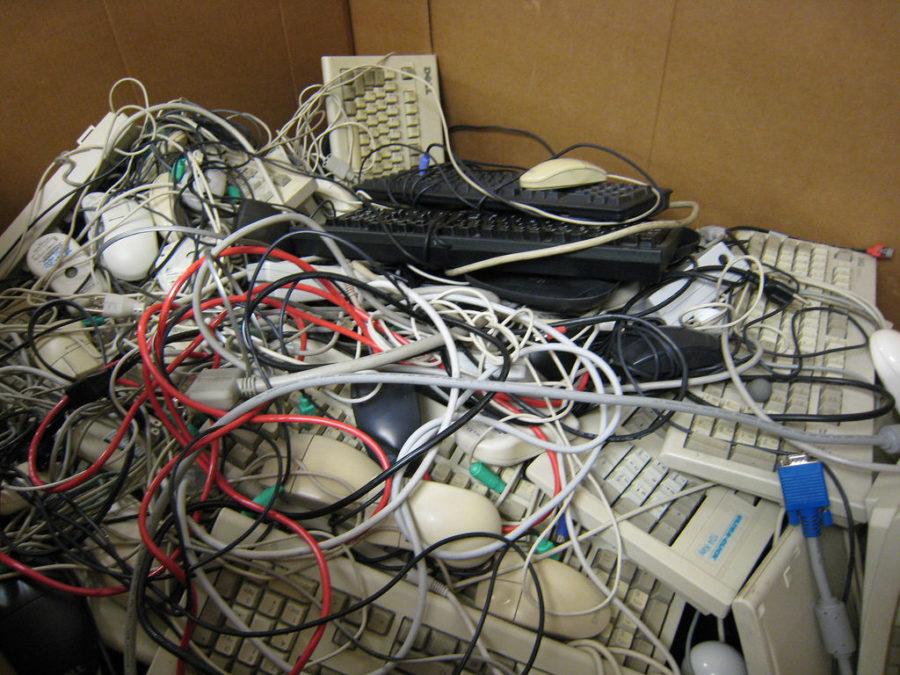The importance of recycling electronics
April 1, 2018
With the fast pace of technological advancements, many consumers consistently upgrade to the latest smartphone, high-definition television or laptop as soon as they hit the market each year.
There were 438 million electronic products sold in 2009, according to the Environmental Protection Agency (EPA), and the EPA says this number is growing larger each year.
Electronics serve many useful purposes and it can be an annoyance when they stop working. When this happens, it is an afterthought for most people that electronics require proper recycling to ensure the least harmful effects toward humans and the environment.
EPA numbers show that U.S. consumers and businesses threw away 2.37 million tons of computers, televisions, cell phones, printers, scanners and fax machines in 2009. With even more electronic waste (e-waste) being thrown away each year, approximately 12.5 percent of it is properly recycled, according to the EPA. The millions of tons that goes unrecycled sits in landfills across the U.S. and around the world.
There are many safety concerns regarding e-waste and plenty of reasons to be mindful when throwing away outdated electronics. Many electronic products such as televisions and computer monitors with cathode ray tubes, LCD desktop monitors, LCD televisions and plasma televisions are built with materials that are toxic to the environment. Some of these toxic materials include lead, cadmium, arsenic and mercury.
Susan Johnson of the Iowa Department of Natural Resources (DNR) said computer monitors and televisions built with cathode ray tubes contain four to eight pounds of lead.
“Electronic waste accounts for about 40 percent of the lead and 75 percent of the heavy metals found in landfills, which is kind of discouraging,” said Johnson.
Johnson said that these materials can seep into the soil and contaminate groundwater. Likewise, if electronics are sitting outside when it rains, then the runoff will collect toxins and contaminate other water sources.
“It’s so easy to throw things away. People don’t think about what’s happening to everything that they’re throwing away,” Johnson said. “Whether [electronics] become hazardous is made by the choice of the person who is disposing of it, whether they are going to recycle it or whether they are going to throw it in the trash.”
At Iowa State, there is a system set in place to ensure that the large amount of e-waste produced by the university is properly recycled and disposed.
“Having that environmentally considerate and sustainably considerate plan for what happens with electronics at the end of their life is crucial,” said Merry Rankin, the director of sustainability at Iowa State.
There are two main places on campus that outdated university-owned electronics will go to ensure they are disposed of safely. They start out at either ISU Surplus or Computer Services at Durham Center. Both places handle university-owned electronics and also address the important concern of data security within the hard drives of outdated computers.
At Computer Services, they collect boxes full of electronics brought in by various departments on campus to send them to ISU Surplus for either reuse or recycling. If Computer Services receives a computer, they wipe off all the data and destroy the hard drive.
“It is possible that even if you have a dead hard drive or a dead flash drive that you can go into it physically and then get the information off of it,” said Conor Phillips, an IT employee at Computer Services. “Inside of a hard drive there’s different little disks that will collect the data that reads and writes to those disks. People can open those up and get that data and extract that data and then rebuild specific files. That’s why we completely destroy it.”
Phillips thinks most people are not aware of how hard it is to completely erase data from a computer’s hard drive. If hard drives are not properly destroyed and recycled, hackers can steal personal information such as passwords or credit card numbers. Phillips said it is important for people to use the necessary precautions when disposing computers to ensure data security.
By using a software program called KillDisk, they are able to erase all the data on a hard drive. After that, they use a hydraulic press to punch a hole through the hard drive, further eliminating the possibility that someone could steal its data. They keep detailed documentation of all the hard drives that were destroyed and where they are currently stored.
“After [hard drives] are all done and even when they are destroyed, we send them to [ISU Surplus] so they can be recycled properly so there is no environmental impact there from that. That sort of eliminates all possibility of even just the smallest piece of data getting out,” said Phillips.
ISU Surplus also does a lot of hard drive wiping and destroying, and they handle the next step to ensure that electronics are properly recycled.
“We’ll probably spend one or two days a week just picking up computer items [from campus] and we’ll come back with carts just heaping full,” said Mark Ludwig, supervisor at ISU Surplus.
“When we get computers in here, the first thing we do is we have to make sure that we wipe all the hard drives and get all the pertinent information off of that. We’re the last line of defense of anything that goes out. We need to make sure that all that information is wiped off,” said Ludwig.
Ludwig said their top priority is data security. By rule, they don’t resell computers that came from places such as the president’s office, student health center, athletics offices, registrar’s office, or anywhere else that could have personal student information.
They put the rest of the computers through tests to determine how much life is left in them. If they are still usable, they offer them for resale. Every Wednesday, ISU Surplus has a storefront that is open to the public to buy used university items. They sell anything ranging from old books to household items to electronics. This keeps items out of the landfill and brings additional money back to Iowa State. Ludwig said they give a portion of the earnings back to the university for every sale over $300.
“We try to be good stewards of the environment and we try keep things out of the landfill. We try to go the extra step to make sure that we use every avenue that we can to dispose of this stuff properly,” said Ludwig.
If ISU Surplus receives a computer that no longer functions, they will harvest it for parts to reuse on other computers in the future, or they sell spare parts to other vendors. What remains of the computer’s carcass will be sent to contracted e-waste recyclers for proper disposal.
ISU Surplus handles much more than just electronics, and they work to redistribute retired university items to other organizations throughout Iowa. Through the DNR’s Iowa Waste Exchange program, they move items to other colleges, communities, organizations and businesses in need.
“The recycling component is not only important from the stand point of keeping those materials out of landfills potentially, but also utilizing the materials that are there and can be used for something else,” said Rankin.
Rankin said it’s important to reuse the refined metals in electronics because continually using energy to mine, extract and smelt those metals is not sustainable. According to the Iowa DNR, it takes two tons of raw materials to make one desktop computer. In addition, the EPA says manufacturing some of these materials creates greenhouse gas emissions.
According to EPA statistics, recycling laptops saves enough energy equivalent to the electricity used by more than 3,500 U.S. homes in a year. And every one million recycled cell phones saves 35,000 pounds of copper, 722 pounds of silver and 75 pounds of gold.
“Eventually we have to consider how much we actually have available to keep extracting,” said Rankin. “These resources are finite.”
Rankin wants people to think about and understand the consequences of their purchasing decisions and to seek out companies that have sustainable practices. “Do a little bit of research in order that you can understand the product you are purchasing, and you can understand what options are available at the end of that products life,” said Rankin.
Many companies such as Best Buy, Staples, Dell, LG, Samsung and others offer take-back or recycling options for used electronics. Rankin encourages people to take advantage of those options and to voice their concerns to companies that don’t offer these types of recycling avenues.
“We as consumers have a very powerful voice in the products that we purchase and the considerations that organizations give in not only the production of their products but also the end-of-life options,” said Rankin. “I encourage people to be vigilante and not be afraid to ask companies for that accountability on things that are important to us and things that impact the future that we envision.”















